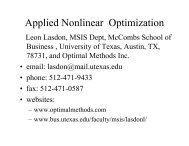[PDF] ALIO Back Matter
[PDF] ALIO Back Matter
[PDF] ALIO Back Matter
Create successful ePaper yourself
Turn your PDF publications into a flip-book with our unique Google optimized e-Paper software.
SD14<br />
3 - Problem Geometry and Problem Robustness<br />
Jorge Vera, Associate Professor, Universidad Católica de Chile,<br />
Casilla 306 Correo 22, Santiago, Chile, jvera@ing.puc.cl<br />
We could say an optimization problem is “robust” if its solution is not very sensible<br />
to changes in the data. This is important when models are used to support decision<br />
making. In this talk we explore the explanatory power of geometric measures of the<br />
feasible region on problem sensitivity and robustness. We do this in connection with<br />
the computation of robust solutions, showing theoretical estimates and some<br />
computational results in simulated as well as real Supply Chain Management<br />
problems.<br />
■ SD14<br />
Aula 365- Third Floor<br />
Auctions<br />
Cluster: Game Theory and its Applications<br />
Invited Session<br />
Chair: Evdokia Nikolova, Postdoctoral Associate, Massachusetts Institute<br />
of Technology, Stata Center, Room 32-G604, 32 Vassar Street, Cambridge,<br />
MA, 02138, United States of America, nikolova@MIT.edu<br />
1 - Empirical Analysis of a Procurement Combinatorial Auction<br />
Marcelo Olivares, Assistant Professor, Columbia University, Uris Hall,<br />
Room 417, New York, NY, 10027, United States of America,<br />
mo2338@columbia.edu, Gabriel Weintraub, Rafael Epstein<br />
In this paper we conduct an empirical investigation of a unique data set of bids in a<br />
large-scale combinatorial auction (CA): the Chilean auction for school meals in<br />
which the government procures half a billion dollars worth of meal services every<br />
year. We develop an estimation strategy to identify features of the firms’ cost<br />
structure and their strategic behavior, and use this information to suggest<br />
improvements to the auction design.<br />
2 - Externalities in Ad Auctions<br />
Nicole Immorlica, Northwestern University, 2133 Sheridan Road,<br />
Evanston, IL, 60208, United States of America, nicimm@gmail.com<br />
We use impression and click data from Microsoft Live to demonstrate that<br />
sponsored search auctions demonstrate externalities (i.e., the value of a slot in a<br />
sponsored search list depends on who else is shown in the other sponsored<br />
positions). We then study theoretically the complete information Nash equilibria of<br />
the auction.<br />
3 - Online Resource Allocation Problems<br />
Patrick Jaillet, Massachusetts Institute of Technology,<br />
77 Massachusetts Ave, Cambridge, MA, 02139,<br />
United States of America, jaillet@MIT.EDU, Xin Lu<br />
Concentrating on a series of specific applications where dynamic resource<br />
allocations arise naturally, such as in sponsored search auctions and other online<br />
auctions, we formulate some online general assignment problems that capture many<br />
aspects of these applications. We then consider the design and analysis of optimal<br />
online algorithms for these problems, built from either greedy principles or from<br />
general primal dual principles.<br />
4 - A Survey of Spectrum Auction Designs<br />
Karla Hoffman, George Mason University, Fairfax, VA,<br />
United States of America, khoffman@gmu.edu<br />
Most developed countries allocate radio spectrum by auction. The Simultaneous<br />
Ascending Auction (SAA) has proven to work well for this application. Recently,<br />
new designs that allow package bidding have been proposed. These designs have<br />
only been tried in the past few years. We first provide some historical background<br />
regarding spectrum allocation, describe the use of the SAA design and its<br />
modifications over the past 15 years, and then highlight the new advances in<br />
combinatorial auction designs and their use for the allocation of spectrum.<br />
■ SD15<br />
Aula 351- Third Floor<br />
Softcomputing for Decision Making and Optimization I<br />
Sponsor: Data Mining:<br />
Knowledge Discovery and Data Mining for Decision Making<br />
Sponsored Session<br />
Chair: Carlos Cruz, Lecturer, University of Granada, DECSAI, c/. Daniel<br />
Saucedo Aranda, s/n, Granada, 18071, Spain, carloscruz@decsai.ugr.es<br />
1 - Neural Networks for Pattern Discovery in a Physiological Process<br />
Isabel Passoni, Universidad Nacional de Mar del Plata, Juan B. Justo<br />
4302, Mar del Plata, Argentina, lpassoni@fi.mdp.edu.ar, Adriana<br />
Scandurra, Gustavo Meschino, Ana Dai Pra<br />
In this paper Self Organizing Map (SOM), a non-supervised neural network, allows<br />
the analysis of a complex physiological process: the alveolar collapse and<br />
<strong>ALIO</strong> / INFORMS International – 2010<br />
46<br />
recruitment in diseased lungs. Recruitment maneuvers are those that seek to reexpand<br />
the areas collapsed of the lung to minimize lung damage induced by the<br />
ventilator. A knowledge discovery task is performed within the experimental data to<br />
determine the level of critical parameters to perform the recruitment maneuvers<br />
successfully.<br />
2 - Representation of Spatio-temporal Knowledge Domains<br />
using Ontologies<br />
Cecilia Delgado, University of Granada, c/. Daniel Saucedo Aranda,<br />
s/n, Granada, Spain, cdelgado@ugr.es, Alberto Salguero,<br />
Buenaventura Clares<br />
This work is an extension of Ontology Web Language, called STOWL (Spatio-<br />
Temporal OWL), where new primitives are included. Theses primitives enable us to<br />
overcome the limitations of OWL to define elements such as n-ary relationships and<br />
functions, partitions, exhaustive decompositions, and rules.<br />
3 - The Use Parametric Quadratic Programming Approach on Fuzzy<br />
Regression Analysis<br />
Ricardo Silva, University of Campinas, av. Albert Einstein, 400,<br />
Campinas, Brazil, rcoelhos@dt.fee.unicamp.br, José Luis Verdegay,<br />
Carlos Cruz, María Teresa Lamata<br />
Regression analysis find out a relationship between variables, i.e, to describe how a<br />
dependent variable is related with independent variables. In this work we consider<br />
regression analysis with imprecise parameters which are natural in real-life situation<br />
requiring solutions, it makes perfect sense to attempt to address them using fuzzy<br />
regression. It can be formulated as a fuzzy optimization problem and we apply a<br />
novel parametric quadratic programming approach in the transformed problem.<br />
4 - ICPRO: A Computational Intelligence Useful Tool<br />
Sebastián Gesualdo, Universidad CAECE, Olavarría y Gascón, Mar<br />
del Plata, Argentina, sebagesualdo@hotmail.com, Isabel Passoni,<br />
Gustavo Meschino<br />
The objective of this work is to present a software design useful to real data analysis<br />
by means of Computational Intelligence tools. The current development stage focus<br />
on a visual tool to deal with fuzzy predicates analysis. The main user requirement is<br />
to allow user entering simples and composed fuzzy linguistic predicates. The further<br />
ones are made connecting simples predicates with logical connectors: and, or, not,<br />
implication. Different fuzzy t-norms and t-conorms can be selected.<br />
■ SD16<br />
Aula 385- Third Floor<br />
Cooperative Evolutionary Algorithms<br />
Cluster: Metaheuristics<br />
Invited Session<br />
Chair: Marco Goldbarg, DSc, Universidade Federal do Rio Grande do<br />
Norte, Campus Universitário Lagoa Nova, CCET, Natal, 59072-970, Brazil,<br />
gold@dimap.ufrn.br<br />
1 - Cultural Algorithms for the Load Dispatch Problem<br />
Richard Gonçalves, MSc., Graduate School on Electrical Engineering<br />
and Applied Computer Science, Federal University of Paraná and<br />
Department of Computer Science, Unicentro University,<br />
Av. Sete de Setembro, 3165, Curitiba, PR, 80230-901, Brazil,<br />
richardehpraler@yahoo.com.br, Carolina Almeida, Myriam Delgado,<br />
Marco Goldbarg, Elizabeth Goldbarg<br />
Cultural Algorithms with Artificial Immune System are presented for the load<br />
dispatch problem with non-smooth fuel cost function taking into account valvepoint<br />
loading effects. Self adaptation, local search based on a quasi-simplex<br />
technique and chaotic sequences are used. The results confirm the potential to solve<br />
real parameter optimization problems.<br />
2 - Computational Transgenetic Applied to Biobjective Traveling<br />
Purchaser Problem<br />
Carolina Almeida, MSc., Federal University of Paraná, Graduate<br />
School on Electrical Engineerin, Av. Sete de Setembro, 3165,<br />
Guarapuava, PR, 80230-901, Brazil, carollina_almeida@hotmail.com,<br />
Richard Gonçalves, Elizabeth Goldbarg, Marco Goldbarg,<br />
Myriam Delgado<br />
A Transgenetic Algorithm (TA) named 2TA is proposed for the biobjective traveling<br />
purchaser problem. One transposon for each objective and a plasmid associated with<br />
the costs of products are developed. The 2TA is compared to a scalarized version of a<br />
TA presented previously. The results encourage further research in 2TA.


![[PDF] ALIO Back Matter](https://img.yumpu.com/17932960/26/500x640/pdf-alio-back-matter.jpg)
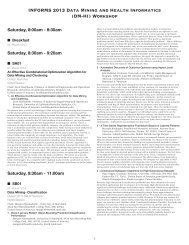
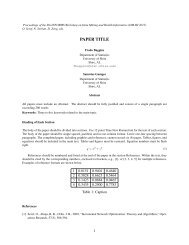
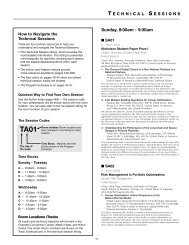
![[PDF] Charlotte Back Matter](https://img.yumpu.com/17933057/1/190x245/pdf-charlotte-back-matter.jpg?quality=85)
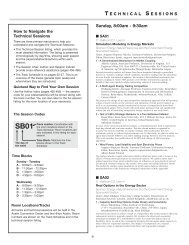
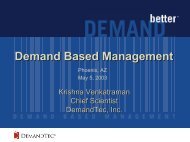
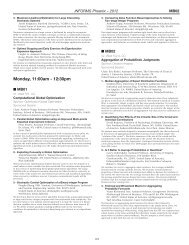
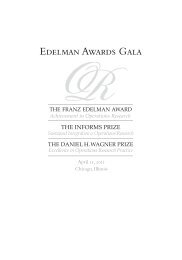
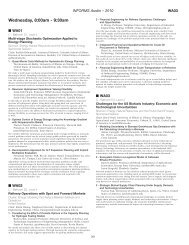
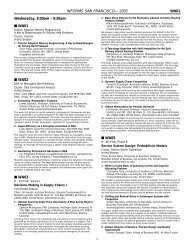
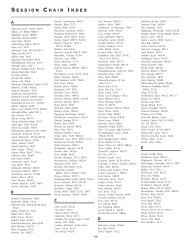
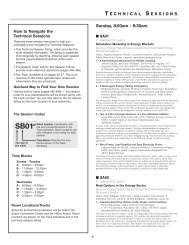
![[PDF] Monday, 8:00am - 9:30am](https://img.yumpu.com/17932954/1/190x245/pdf-monday-800am-930am.jpg?quality=85)
